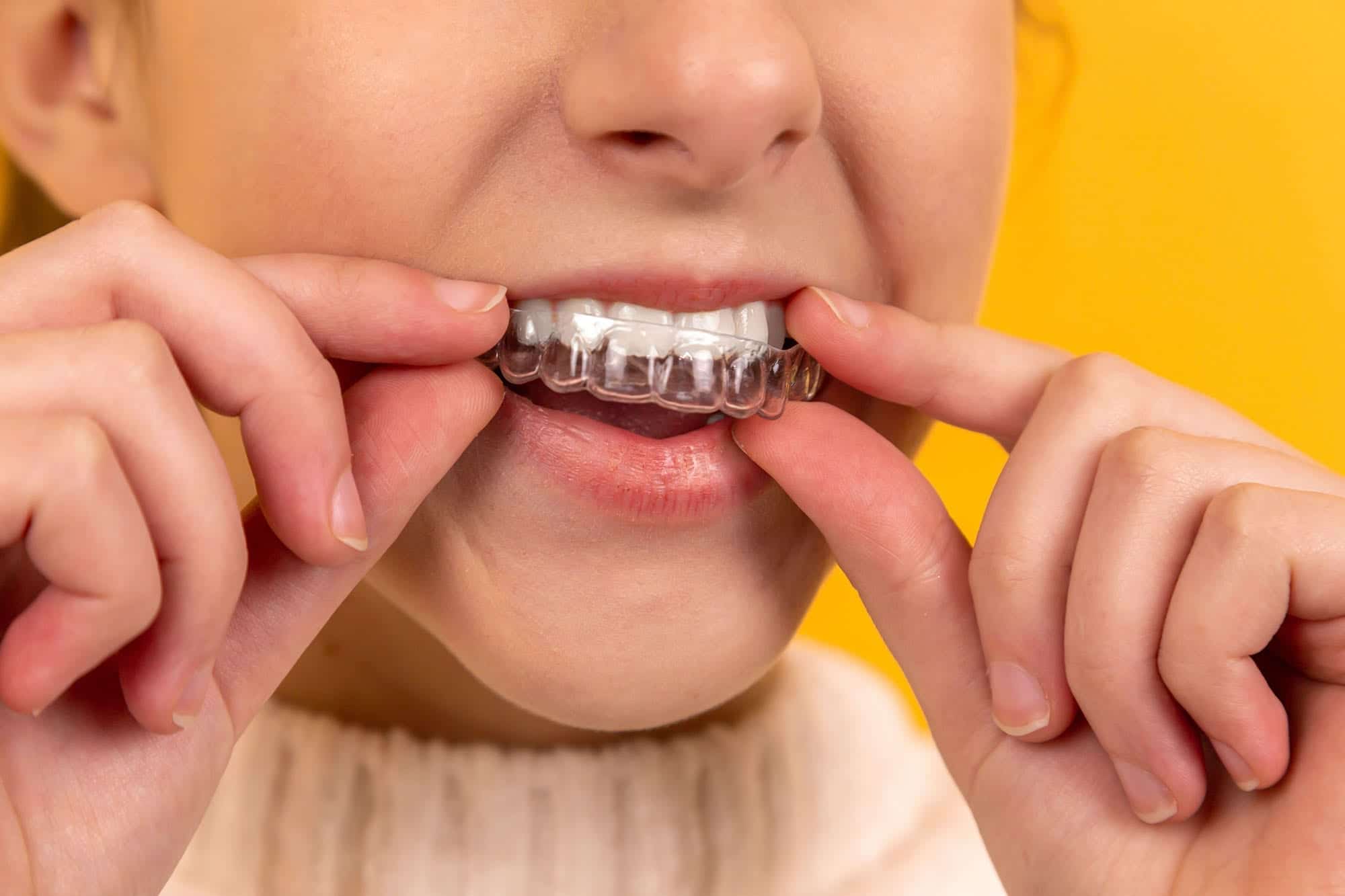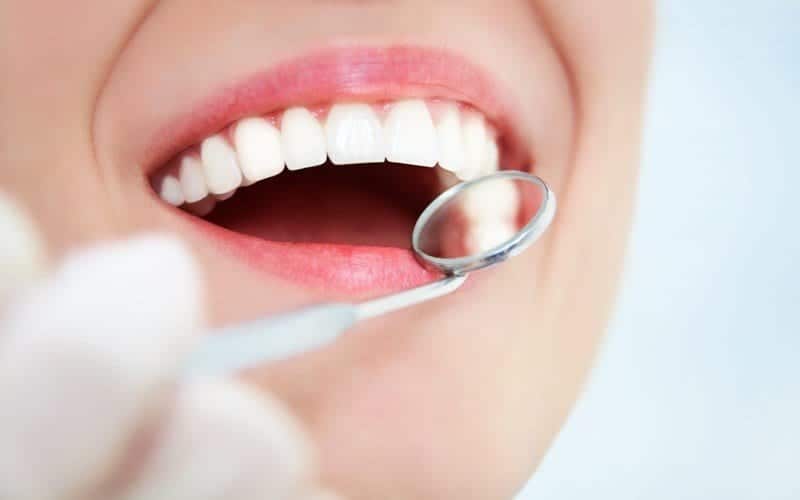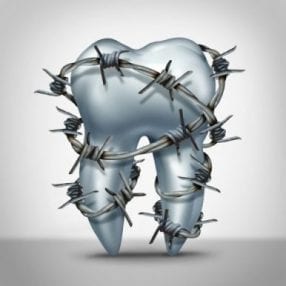Every adult has experienced a toothache, but did you know that the most common kind of toothache is due to tooth sensitivity? Tooth sensitivity refers to discomfort of your tooth or teeth that’s due to pain that’s shooting, sharp, and sudden but temporary. It’s usually triggered when you eat something hot, cold, acidic, sweet, and so on.
Dealing with tooth sensitivity usually involves treating the underlying cause, whether it’s tooth decay or periodontal disease that eats away at your enamel or cementum. Your enamel needs reinforcement and your gums need treatment in order to desensitize your teeth. There are even toothpastes like Sensodyne that assist those who have sensitive teeth to reduce all this sensitivity.
Why Tooth Sensitivity Occurs
Tooth sensitivity happens when the enamel protecting a tooth gets thinner and thinner, which can also result in dental caries or cavities. This is the reason why teeth whitening or bleaching tends to cause tooth sensitivity, actually. The bleaching process can get so strong that the enamel becomes thin enough to make the teeth sensitive. It also occurs because of gum recession or when the gums recede from the tooth, resulting in the exposure of the tooth root and dentin.
The enamel and the gums are supposed to protect the dentin and the underlying tooth pulp, nerves, and roots beyond that layer. The lack of enamel and gum exposed all these sensitive parts of the tooth, which in turn makes them react in writhing pain due to how much more connected the pulp and dentin is to the nerves of the tooth. The pain from sensitive tooth typically reacts to food or drinks that are too cold or too hot. There’s a reason for this.
It’s because teeth need nerves in order to help them grow, get nutrients from the bloodstream, and to help gauge the temperature of what you eat to see if it’s safe to eat or not. However, extra sensitive teeth make it hard for you to eat anything hot or cold that you can normally consume just fine with normal teeth. You can’t eat ice cream or coffee if you have tooth sensitivity or at least it will be quite difficult to do so.
Signs and Symptoms

It’s not only hot or cold food and drinks that affect your tooth sensitivity. Very acidic and sweet dishes and beverages can also make your sensitive teeth ache; the same goes for breathing in cold air over your teeth. All of these things can make your teeth ache if they’re sensitive or suffer from sensitivity due to thinning enamel. Tooth sensitivity is a condition that can come and go as time passes by.
You can suffer from temporary, sharp pain in your teeth from certain activities and circumstances such as brushing, drinking, eating, and so forth. The pain usually quickly disappears after the source of the pain is removed and the ache itself settles down. Aside from exposed tooth roots from receding gums and worn tooth enamel, the discomfort one is feeling might originate from other factors such as gum disease, a worn filling, a chipped or cracked tooth, or cavity.
Origins of Dentin Hypersensitivity
The enamel is what protects your teeth and gives it the hard shell that allows it to cut up, chew, and grind most types of food into digestible chunks. Beyond this hard, outer layer of your teeth is the dentin, which is the material that your tooth is primarily made of. It contains microscopic tubules filled with tiny nerve endings that allow you to gauge whether what you’re eating is hot or cold or if you’re biting into something so hard that it’s damaging your teeth.
The dentin extends down to your tooth root, which in turn is protected by a cementum layer. The American Dental Association or ADA claims on its “Mouth Healthy” website that nerve irritation or dentin hypersensitivity happens when the dentin loses its enamel shield or cementum layer, exposing the nerve endings to sweet, acidic, spicy, sticky, hot, or cold foods. You’ll be having sharp pangs of pain every time you eat ice cream or drink wine.
Some factors that contribute to tooth sensitivity include the following:
- Brushing Too Hard: You can have or do much of a good thing such that you’ve gone overboard with it. Don’t brush your teeth with too much force because it can cause the enamel covering to wear down from sheer friction and effort. Avoid using hard-bristle toothbrushes that can damage the outer shell or tear up your gums, thus exposing the dentin or cementum underneath.
- Teeth Whitening: When you bleach your clothes, you should be aware that leaving them soaking in bleach for too long frays the threads, leaving them threadbare when push comes to shove. The same thing happens to enamel when you attempt to whiten it with a tooth-whitening bleach. This is why many people anecdotally report that their teeth have become sensitive after undergoing the procedure. However, the latest teeth whitening gels have addressed this problem by reducing their peroxide concentration.
- Gum Disease: Inflamed gum tissue pulls away from your teeth, leaving vulnerable areas like the cementum layer and the tooth root exposed to nerve-wracking stimuli from spicy to sweet food as well as hot or cold beverages. You could be suffering from mild and treatable gingivitis to expensive periodontitis, thus requiring deep cleaning or scaling.

Tooth Sensitivity Treatment
Visit your dentist at his clinic ASAP if sensitive teeth are bothering you. He can be the one to figure out or rule out any underlying reasons for why you’re in pain dentally. He knows the best steps to take for treatment. Depending on the situation, your dental professional might recommend the following procedures that should help deal with your toothache dilemma.
- Desensitizing Toothpaste: The pain caused by your thinner enamel can be desensitized by desensitizing toothpaste like Sensodyne. After several applications of this product, it can sometimes assist in blocking your pain linked to having tooth sensitivity. There are various toothpastes and products available OTC to help you with this problem. Talk to your dentist to learn more about this option.
- Prescription Fluoride: There’s fluoride in your tap water not for the sake of some great government conspiracy but instead for the sake of making your teeth stronger and more hardened than before, especially when it comes to teeth with a thin enamel layer. Applying fluoride to your teeth’s sensitive areas should reduce pain and strengthen your tooth enamel. You might also be recommended the use of prescription fluoride at your home that’s applied through a custom tray.
- Dental Sensitivity Strips: There are dental sensitivity strips you can apply to your teeth like the Crest Sensi-Stop Strips to stop the aching associated with sensitive teeth. These strips are thin and flexible enough to be applied directly onto your teeth the same way whitening strips could. They provide targeted delivery of the key ingredient that strengthens and desensitizes your teeth from extreme pain. It builds a lasting barrier over your enamel within minutes, giving you relief for up to a month or 30 days.
- Desensitizing or Bonding: Typically, root surfaces that are exposed by receding gums require treatment by what’s known as bonding resin. This resin is applied to the sensitive surfaces of the exposed roots to minimize or remove the pain altogether. The application itself is painful though so you’ll need a local anesthetic to deal with it. Afterwards, your gingivitis or periodontal disease will require treatment as well.
- Surgical Gum Graft: If you’ve lost gum tissue around your tooth that’s needed to hold it together to your jaw then there’s a way to get that gum back without waiting for it to heal (since that will take too long and you might lose the tooth in the process). It works by taking a small amount of gum tissue from elsewhere in your mouth then putting it on the affected site with receding gums. This protects the exposed roots from pain and sensitivity.
- Root Canal: This is probably a good last resort that works not only on sensitive teeth but teeth with huge cavities in them thus necessitating a root canal or endodontic process. It’s recommended for those suffering from particularly powerful or severe pain from sensitive teeth that cannot be solved by other treatments like desensitizing toothpaste or surgical gum graft.
This procedure treats problems related to the dental pulp or the tooth’s soft core. It’s a significant treatment that essentially removes the root and pulp of the tooth, essentially killing it permanently, before its remains are used to house the crown while its insides are filled with inert material for good measure. It’s the most successful method for dealing with tooth sensitivity thanks to its killing of the nerve itself.
Prevention of the Condition
One of the ways to prevent the recurrence of tooth sensitivity is brushing your teeth at least twice a day to three times a day or after every meal with a soft-bristled toothbrush. When it comes to sensitive teeth, a healthier mouth begins and ends with good brushing habits. Make sure all parts of your mouth, including along the gum line and between the teeth, are thoroughly cleaned by your brushing and flossing.
Remember, a pound of cure can never compare to an ounce of prevention so it’s time to pay attention to your dental hygiene habits.
- Fluoride or Desensitizing Toothpaste and Brushes: You should use fluoride toothpaste and/or desensitizing toothpaste for good measure. Use gentle strokes as you brush instead of harsh or vigorous scrubbing as though you’re tearing through the corrosion of a rusty gate since that could damage the already thin enamel. Don’t be too gentle though because you’re supposed to remove plaque as well.
Brush gently and rinse your mouth thoroughly every time. Your brush head of sorts is also relevant when treating sensitive teeth. To be more specific, you should use Oral-B Sensitive Replacement Brush Heads for tooth sensitivity treatment. This soft-bristled brush head or any soft-bristled toothbrush will gently clean your thinning enamel and help prevent gum loss.
- Floss Daily: Furthermore, floss daily because pieces of rotting food will only serve to further feed the bacteria inside your mouth, which will have them produce more and more acid that destroys your gums and your teeth’s outer shell. Flossing is important because it catches the bits of food your brushing usually misses. Your floss should be soft as well.
- Mouth Guard: If you’re a teeth grinder or suffer from bruxism, ask your dentist for a mouth guard like what professional boxers wear. Bruxism can cause sensitivity and fracture teeth for good measure. Just as mouth guards protect your teeth from a boxing punch’s blunt force so too does it protect your teeth from themselves when you unconsciously grind on them when you sleep.
- Avoid Acidic Foods or Take Care When Consuming Them: Take care of your teeth as well when eating or drinking acidic foods and beverages like wine, citrus fruit drinks, and carbonated drinks. All of these menu items can remove bits and pieces of tooth enamel over time. You should avoid them as much as possible.
You should use a straw when drinking acidic liquids to limit teeth contact, for example. Additionally, once you’re done eating or drinking an acidic type of substance, water it down by drinking water to balance out the pH or acidity levels in your mouth. In fact, you should drink water instead of wine or soft drinks.
In a Nutshell

Sensitivity happens when the enamel or outer shell of your teeth becomes thin enough to expose the dentin or porous tissue of teeth to outside elements or temperature changes. The tubules of the dentin or its microscopic channels serve as pathways to the nerve. Your sensitive tooth is aching like something hit its raw nerve because that’s literally what’s happening. When these tubules are exposed because of enamel loss and receding gum, nerves are more readily triggered by acid and temperature.
If you’re a tooth sensitivity sufferer, you should avoid daily activities such as consuming high temperature foods and beverages whether they’re too hot or too cold. You should also brush on the regular, like twice or thrice a day after eating. Such activities can cause pain to your sensitive teeth. Don’t live in the constant fear of suffering. Do something about it and add fluoride to your daily dental hygiene. Always floss and look into services such as surgical gum graft and root canal.
Thantakit International Dental Center is Thailand’s longest established dental center. Situated in Bangkok, our clinic is renowned across the world as a destination for world-class dentistry, with most of our patients flying to us from Australia.
Please contact us today and get a FREE dental consultation.













